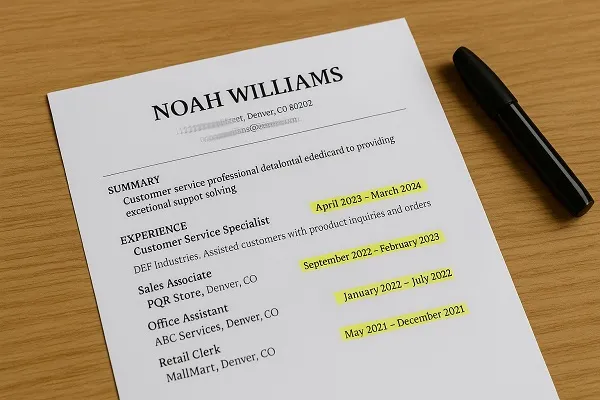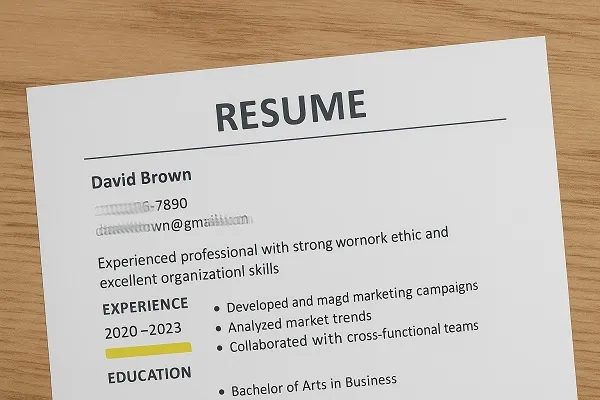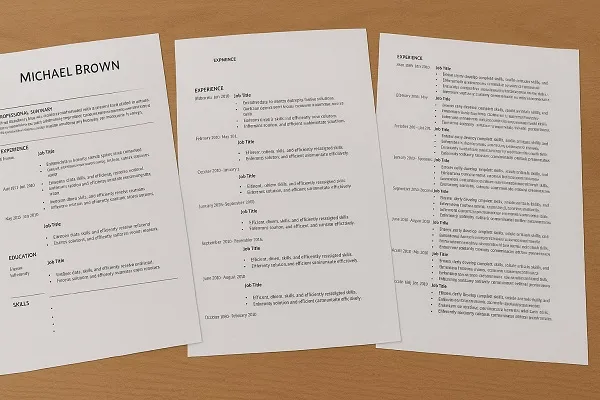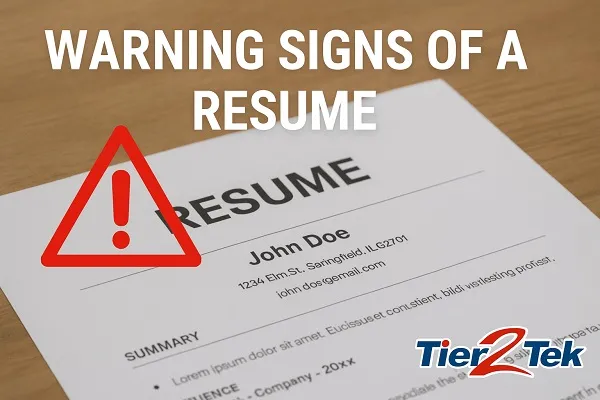Warning signs of a resume can reveal more than a candidate intends, and understanding these signals helps employers quickly spot potential problems before investing time in interviews. When a resume contains inconsistencies, missing details, or signs of exaggeration, it can indicate concerns about a candidate’s experience, professionalism, or reliability. Below are the most common red flags that hiring managers should watch for when evaluating applicants.
Poor Grammar, Formatting, or Spelling
A resume is often the clearest sample of a candidate’s attention to detail. When basic errors appear throughout, it suggests the applicant either rushed or didn’t care enough to review their own work.
Resumes with mistakes can signal poor communication skills, weak organization habits, or limited professionalism. If a candidate cannot produce a polished document for a job application, it raises questions about how they will handle written communication in the role.
Excessive Job Hopping

While short-term roles can be valid, a pattern of constant movement between jobs without explanation often points to instability.
What job hopping may indicate
- Difficulty working with teams or supervisors
- Performance concerns that led to frequent departures
- A lack of long-term commitment
- Impulsive job changes without clear career direction
A few quick moves are normal, but repeated short stints should prompt deeper questions during screening.
Job Titles That Don’t Match Responsibilities
When job titles appear inflated or inconsistent with the duties listed, it can signal misrepresentation.
Warning signs
- Senior titles paired with entry-level responsibilities
- Claims of leadership without any supporting details
- Titles that sound unusual for the industry
- Responsibilities that don’t align with typical job standards
This mismatch may indicate an attempt to appear more experienced than the person actually is.
Employment Gaps Without Explanation

Gaps in work history are not inherently negative. The concern arises when a candidate leaves these gaps unexplained.
Transparent applicants provide a brief context, such as freelancing, education, or caretaking. When the resume avoids addressing long breaks, it can suggest instability or an attempt to hide a complicated work history.
Skills List That Doesn’t Match Experience
Skills should connect directly to the work a candidate has performed. When a resume lists advanced abilities without relevant experience, it raises questions about accuracy.
Common mismatches
- Technical programs with no project examples
- Leadership skills without leadership roles
- High-level abilities that seem out of place
- Long lists of software or tools with no usage details
This is often a sign of inflated qualifications or keyword stuffing rather than genuine expertise.
Too Many Short Certifications or Irrelevant Courses
Stacking numerous quick online courses can sometimes be a sign of padding rather than true capability.
Short certifications that don’t relate to the role or career path may suggest the candidate is trying to compensate for a lack of hands-on experience. While professional development is positive, employers should check for depth rather than quantity.
Missing Company Details or Incomplete Information

A resume missing key information makes it difficult to evaluate or verify the candidate’s background.
Details that should raise concern
- Company names not listed
- Missing locations for past employers
- Job descriptions with no dates
- No contact information for the applicant
- Unspecified degree or school name
When essential information is vague or absent, it suggests the applicant may be hiding something or lacks attention to detail.
Keywords Stuffed Without Context
Many candidates tailor resumes for applicant tracking systems. The problem arises when keywords are forced into the document without meaning.
Signs of keyword stuffing
- Long lists of unrelated skills
- Repeating the same terms multiple times
- Including buzzwords not supported by experience
- Adding tools or software never used
This usually signals that the candidate is optimizing for algorithms instead of showcasing real qualifications.
Overly Long or Overly Short Resume

A resume that is too short may lack necessary depth, while one that is too long may include irrelevant content that distracts from the applicant’s strengths.
Overly short resumes may indicate
- Limited practical experience
- An attempt to hide frequent job changes
- Lack of achievements or impact
Overly long resumes may indicate
- Poor judgment about what is relevant
- Difficulty prioritizing information
- Padding to appear more experienced
The ideal resume is focused, concise, and complete.
Buzzwords or AI-Generated Content
A growing number of resumes show signs of being partially or fully AI-generated, or packed with generic phrases that say little about actual work.
Red flags
- Repetitive corporate jargon
- Sentences that sound mechanical or overly polished
- Skills and claims that feel vague or copy-pasted
- No clear examples of real projects or tasks
Buzzword-heavy or AI-generated content often signals that the candidate is over-relying on tools instead of presenting authentic experience.
Lack of Career Progression

When a resume shows years of experience but minimal advancement, it may indicate performance concerns or lack of growth.
Why this matters
- Career progression shows increasing responsibility
- Lateral moves without explanation can raise questions
- Staying in the same role for long periods may indicate stagnation
Some fields naturally have slower advancement, but consistent upward movement typically reflects engagement and capability.
Unusual Extras That Don’t Belong on a Resume
Some applicants include overly personal or unconventional items that distract from their professional qualifications.
Examples of inappropriate additions
- Personality test results
- Astrological signs
- Decorative or themed photos
- Irrelevant personal slogans
- Non-professional graphics
Creative resumes can work in select fields, but random personal add-ons often show poor judgment and a misunderstanding of professional standards.
Lack of Relevant Experience
A resume overflowing with unrelated roles or tasks can be a significant warning sign, especially for specialized or senior-level positions.
What this may indicate
- Misalignment between the candidate and the job requirements
- A broad but unfocused work history
- An attempt to apply without the core qualifications needed
- A misunderstanding of the position
Transferable skills do matter, but for technical or advanced roles, relevant experience is essential for success.
A resume offers valuable insight beyond job history alone. By understanding these warning signs of a resume, hiring managers can quickly identify inconsistencies, avoid costly mistakes, and focus on candidates who demonstrate genuine qualifications and professionalism. These signs are not always automatic deal breakers, but they help guide smarter and more informed hiring decisions.
Content reviewed and published by Tier2Tek Staffing Editorial Team .

